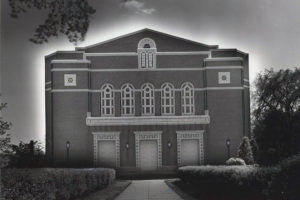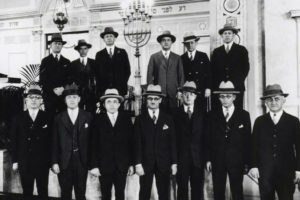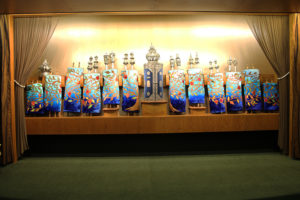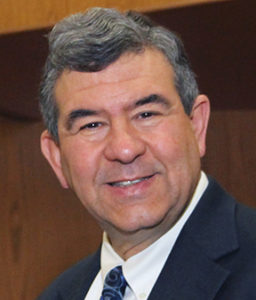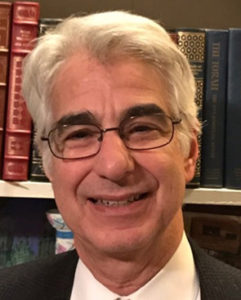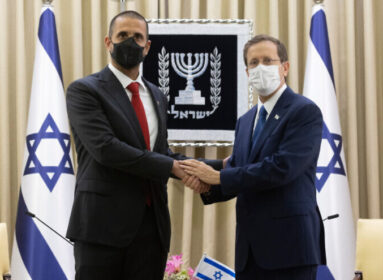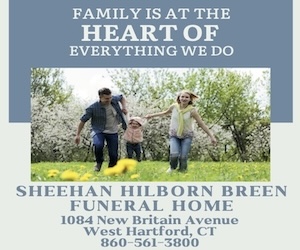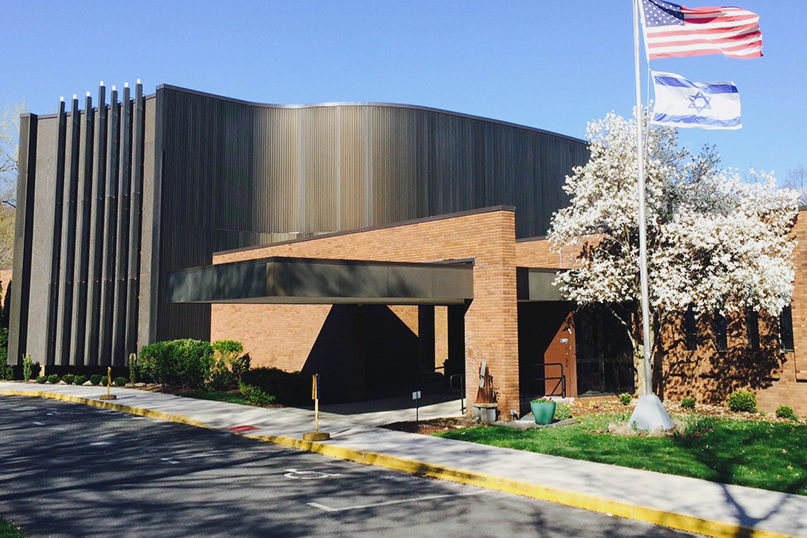
By Stacey Dresner
WEST HARTFORD – Susan Goldberg recalls with fondness the Friday night services that were held at The Emanuel Synagogue when she was a teenager. At that time, the Emanuel was located on Woodland Street in Hartford.
“When the service was over everybody went to Keney Park, which was across the street from The Emanuel,” Goldberg says. “But it wasn’t just Emanuel, it was all of the synagogues – that whole area was Jewish. So after services everybody went into Keney Park. You had your nice clothes on; you would walk around and say, ‘Hey, how are you?’ It was social. It was an amazing thing, not just being there with the Emanuel people, but with the whole Jewish community.”
When The Emanuel Synagogue celebrates its 100th anniversary at a Centennial Shabbat weekend May 3-4, its members won’t be trekking over to Keney Park after Friday night services. But they will be remembering those golden years.
“It will be a nostalgic evening, so there is going to be some storytelling and reminiscing,” says Elysa Graber-Lipperman, Emanuel president.
The 8 p.m. service will be a “homecoming” service of sorts, with current and past Emanuel members joining together to share memories. Longtime Emanuel member Arlene Neiditz will give a keynote address.
“I see The Emanuel as a force,” Neiditz said. “A lot of people have a done a lot of wonderful things for The Emanuel, but it is what the Emanuel gave me that is important.”
Hazzan Sanford Cohn and The Emanuel Adult Choir will play familiar melodies from the past during the service, which will be followed by an oneg Shabbat prepared by the shul’s Sisterhood.
The congregation’s spiritual leader, Rabbi David Small, explains that, while Emanuel’s Friday night services today are around sunset in the winter and 6 p.m. in the spring and summer to accommodate families heading home for leisurely Shabbat dinners, years ago congregants would head back to Emanuel for the more formal 8 p.m. service.
“For many years that was the model,” notes Small. As a “salute to that era,” he adds, the Centennial Shabbat will begin with what Small calls Emanuel’s “classic” 8 p.m. Friday night service.
“It will be really nice and be a way of celebrating past generations, which is very important,” he says.
On Saturday morning, Graber-Lipperman and Small will both speak about Emanuel’s past, present and future.
“We are going to organize the Torah service a little bit like Simchat Torah in the sense that there will be aliyot to the Torah for everybody, emphasizing the role of all the congregants in the life of the synagogue,” he says.
The Shabbat weekend is just one of the events that will be held throughout the year to commemorate The Emanuel’s centennial.
Other events include a Community Service Day, a bike ride, a Centennial Party, and a Cantor’s concert.
“We wanted to find a way to appeal to all different cohorts within the congregation,” Graber-Lipperman said.
Family Roots
Founded in 1919, The Emanuel Synagogue was the first Conservative congregation in Connecticut, according to Emanuel archives.
“At the time that it was founded the Conservative movement was still evolving,” Small says. “So in the founding documents, the way that the founders described the vision of the synagogue, it certainly was set up as a template for many synagogues that emerged.”
Led first by Rabbi Leon Spitz and then Rabbi Abraham Nowak, The Emanuel’s noted longtime spiritual leader, Rabbi Morris Silverman, arrived in 1922, staying on for 38 years. The Emanuel Synagogue building on Woodland Street was dedicated in 1927. Cantor Arthur Koret joined the synagogue’s clergy in 1949 and remained at the shul for 42 years.
“The legacy of both Rabbi Morris Silverman and Cantor Arthur Koret were and are powerful in the synagogue and it’s an extra honor to serve in the place where such giants of the movement have been and done their work,” Small says.
Those giants of the past have not been forgotten.
“Rabbi Silverman was warm and charismatic. His wife, Althea, was a very strong person. And Alfred Weisel z”l [Emanuel’s education director for 32 years] was a big influence on me,” said Susan Goldberg, who is part of a four-generation Emanuel family that includes her son Lance and his family.
Like Goldberg, Arlene Neiditz’s family history is also intertwined with that of The Emanuel. Her mother had attended religious school at Emanuel when she was a child, and when her parents married in 1935 in the home of her grandparents, Rabbi Silverman conducted the ceremony. Neiditz’s parents joined the synagogue as members when Arlene was in the third grade.
Neiditz’s husband Daniel’s grandparents were also very early members of The Emanuel. Daniel’s parents were married by Rabbi Silverman and he and Arlene were married by Rabbis Silverman and Novik in 1962. And the three Neiditz children all celebrated their b’nai mitzvah at Emanuel and were married by Rabbi Gerald Zelermyer, who served as the synagogue’s spiritual leader from 1983 until his retirement in 2002.
“For me the foundation for my life, beyond the influence of my parents, was given to me at The Emanuel,” says Neiditz. “It gave form and substance to my life.”
Goldberg recalls a huge congregation on Woodland Street, which on High Holidays had to hold services in the synagogue’s auditorium, at nearby Weaver High School for college students and at the Northwest Junior High School for religious school students.
“Emanuel was really an enormous congregation at the time. It was a very exciting time,” she says. “It was a wonderful community and a wonderful shul. It was special and beautiful. There was no Sunday school, there was Sabbath School on Saturday mornings. We had classes with wonderful teachers and then we went into the main sanctuary and where Rabbi Silverman would talk to the children during services and ask questions.”
Much of the social life for children and teens like Goldberg back then was based at Emanuel. She recalls leaving Shabbat dinner to run to Friday night services and then heading back to shul for 8 p.m. services. Besides congregating at Keney Park, she also remembers hanging out at the Emanuel and even doing Israeli folk dancing.
“There was a lot going on for teenagers,” says Goldberg.
Rabbi Small said that the social element of synagogue life continues to be important at Emanuel, which has been located on Mohegan Drive in West Hartford since 1967.
“I would say the difference is while it seems like the social spot of the week was Friday night back in the day, today the social spot of the week is
Saturday at noon, at the end of the Shabbat service where we always have a Shabbat Kiddush…People stay and have lunch and talk to each other. It’s intergenerational. The kids play and the older generation share their stories. That’s sort of our Keney Park today,” he says.
Merger Strengthens the Congregation
The Emanuel’s Centennial celebration will continue into the spring and summer.
On May 19 the Emanuel will hold a Community Service Day.
On July 14 there will be a historic bike ride.
“We were trying to have sites that have significance currently or previously, over the course of Emanuel’s 100 years,” said Rona Gollob, who is leading the bike ride committee. Golub was a member of Beth Hillel Synagogue, a Conservative congregation in Bloomfield that merged with Emanuel last year.
“Since Emanuel merged a year ago with Beth Hillel, we are including Beth Hillel sites. It’s part of the history of Emanuel,” she says, calling it “a bike ride with a purpose.”
The main 65-mile route (which turns out to be 100 meters) is still being planned but they expect to bike to sites including the Emanuel Cemetery in Wethersfield, the old Emanuel building on Woodland Street in Hartford, the old Beth Shalom building on Cornwall Street in Hartford (Beth Shalom, which served as Rabbi Philip Lazowski’s first pulpit, later merged in 1969 with Beth Hillel Synagogue), Beth Hillel Synagogue on Wintonbury Avenue, and then Beth Hillel Synagogue Cemetery in East Granby.
“We have the honor of incorporating ourselves with another congregation with a very proud and beautiful history,” Small says of Beth Hillel. “This has been a fantastic asset for the folks who have come over and for Emanuel because the Beth Hillel contingent have added a tremendous amount to synagogue life immediately. Rabbi Philip Lazowski and Ruth Lazowski and their family have been only wonderful to our congregation and are such a treasure in our midst.”
The Centennial Party & Cantors Concert
More celebrating is planned for Sept. 15 when a special Centennial Party will be held at Emanuel.
“We expect it to be large and well-attended,” Graber-Lipperman says. “We’re going to feature some speakers and we’re having the Jewish Historical Society make a video for the party. We would like to include as many people from the community that would like to attend.”
The party will feature food, music and dancing. “The theme is ‘Through the Years’ so there will be pictures from all different years, and music from all different years so people can dance,” Graber-Lipperman said.
Finally, a Cantor’s Concert will be held on Nov. 17 featuring not only Emanuel’s Hazzan Sanford Cohn, but Cantors Gideon Zelermyer, Thom King, Laura Breznick, JTS cantorial candidate Jacob Greenberg, a former University of Hartford student who was mentored by Cantor Cohn, and Cantor Michael Zoosman, who grew up at The Emanuel and now serves at a synagogue in Rockville, Maryland. Beth El Temple’s Cantor Joseph Ness will conduct the Beth El orchestra.
Cantor Sanford Cohn says the Cantor’s concert will feature a combination of traditional cantorial music, along with other genres such as show music and Yidddish folk songs.
“The Emanuel has a long musical legacy that was first established by Cantor Arthur Koret,” says Cohn. “While the musical style of our services has evolved through the years, we still place a high value on music in our congregation.”
Rabbi Small praises the committee members who have been organizing the different facets of the Centennial celebration.
“The role of the lay leadership in planning of the events has been in the forefront and that speaks to one of the ways we remain a dynamic congregation,” he says.
“Today and in the future the goal is ‘engagement’ of our members so they are not only coming to receive the services provided by the clergy and staff – although that is very important – that they are engaged in offering their talents, their energies and thoughts in shaping what we do. The way in which the centennial events have been planned is an example of that philosophy that is so much a part of our congregation.”








 Southern New England Jewish Ledger
Southern New England Jewish Ledger